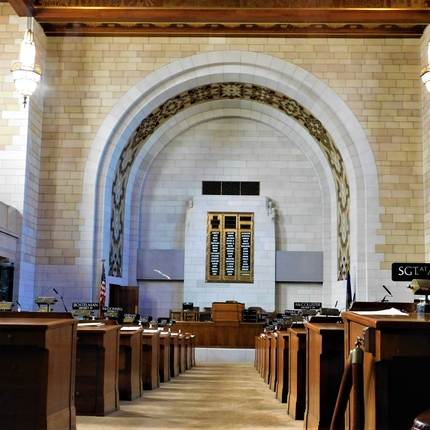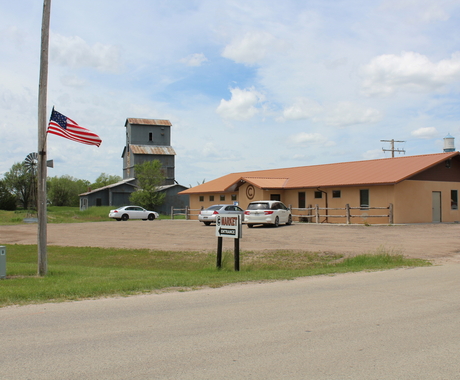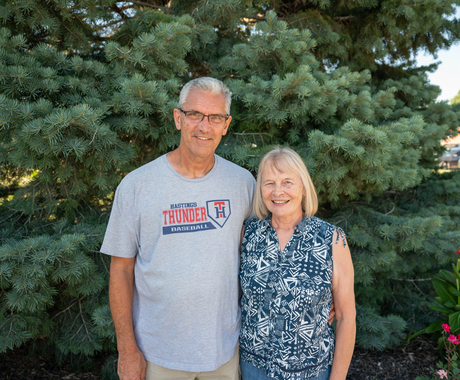By Johnathan Hladik, former policy director
Welcome back to the Center for Rural Affairs Unicameral Update. Today is day 24. As a reminder, the 2017 session is a “long” session – legally mandated to be 90 days in length. The legislature opened on Jan. 4, 2017, and is tentatively scheduled to adjourn on June 2, 2017.
The deadline for bill introduction was Jan. 18. Each bill introduced will be heard in one of 14 standing committees. Committee hearings begin in mid-January and last through early March.
Below is a selection of priority bills we are following. We emphasize those immediately subject to legislative action. New developments are italicized.
Budget and Tax
LB 44 (Watermeier) - Adopt the Remote Sellers Sales Tax Collection Act. Online retailers headquartered elsewhere are not required to collect sales taxes in Nebraska. Though Nebraskans are technically required to report sales tax owed via online purchases on their tax documents, few avail themselves of this opportunity. LB 44 would require online retailers to collect and/or report this tax. A similar bill, LB 564 (McCollister) has also been introduced.
Referred to Revenue Committee. Support. Hearing held Jan. 27, 2017. Center for Rural Affairs offered testimony in support.
LB 337 (Smith, at the request of the Governor) - Change income tax rates and provide for deferrals of the rate changes. Under this proposal the individual tax rate for the highest income bracket will decrease from 6.84 percent to 5.99 percent between 2020 and 2027. This will apply only to individuals earning $29,000 or above, married couples filing jointly earning $58,000 or above, married couples filing separately earning $29,000 or above, heads of household earning $43,000 or above, and estates or trusts earning $15,150 or above. Tax rates do not change for those in the lower three brackets. The brackets themselves stay the same. These changes take effect only when expected rate of growth in net general fund receipts exceed 3.5 percent. Deferred reductions take effect only when expected rate of growth in net general fund receipts exceed 4.2 percent.
Referred to Revenue Committee. Oppose. Hearing scheduled for Feb. 8, 2017.
LB 338 (Brasch, at the request of the Governor) - Adopt the Agricultural Valuation Fairness Act. This bill would reform the method by which property is valuated by shifting from a market-based assessment to one based on income potential. Income potential would be determined by land capability, 10-year average yields, and county-based commodity prices. The proposal also requires that valuation be set at a range between 60 percent and 75 percent of actual value and caps total statewide valuation growth at 3.5 percent over the prior year. These provisions would take effect in 2019.
Referred to Revenue Committee. Oppose. Hearing scheduled for Feb. 8, 2017.
Consumer Protection
LB 67 (Brasch) - Adopt the Fair Repair Act. Many manufacturers withhold diagnostic and repair information, technical updates, and software corrections from the general public. This is especially prevalent in newer farm machinery. As a result, it impossible for individuals and independent repair providers to maintain equipment without the help of the original manufacturer. LB 67 requires the original manufacturer make available for purchase by the owner or an independent repair provider any information or equipment required for repair upon fair and reasonable terms.
Referred to Judiciary Committee. Support. Hearing scheduled for March 9, 2017.
Economic Development
LB 79 (Blood) - Adopt the Small Business Retirement Marketplace Act. Many rural Nebraskans are employed by small businesses. It is uncommon for small businesses to offer a retirement plan to its employees. This bill seeks to fill that void by directing the State Treasurer to create a small business retirement marketplace. The marketplace encourages savings for retirement by offering IRA and employer contribution plans to Nebraskans that choose to enroll.
Referred to the Nebraska Retirement Systems Committee. Support. Hearing held Jan. 27, 2017. Center for Rural Affairs offered testimony in support.
LB 387 (Lindstrom) - Change and eliminate provisions relating to various tax credit programs and economic development activities. The Nebraska Advantage Microenterprise Tax Credit provides tax credits to applicants for creating or expanding microbusinesses that contribute to the revitalization of economically distressed areas through the creation of new or improved income, self-employment, or other new jobs in the area. Distressed area is one that has (a) an unemployment rate which exceeds the statewide average, (b) a per capita income below the statewide average, or (c) had a population decrease between the two most recent federal decennial censuses. This proposal would remove the ‘distressed area’ requirement.
Referred to Revenue Committee. Oppose. Hearing scheduled for Feb. 9, 2017.
LB 523 (Walz) - Change provisions relating to financial assistance from the Nebraska Internet Enhancement Fund (NIEF). The NIEF was created to provide financial assistance to install and deliver broadband internet in underserved areas. Highest priority is given to applicants based on high-cost factors, including population scarcity and location remoteness. The NIEF fund has been utilized only 13 times since its inception in 2001, and not since 2012. LB 523 removes regulations that prevent communities from taking advantage of this program.
Referred to Transportation and Telecommunications Committee. Support. Hearing scheduled for Feb. 13, 2017.
Energy and Environment
LB 87 (Blood) - Redefine a qualified facility and authorize distribution utilities to waive certain requirements related to net metering. Net metering allows electricity customers to generate electricity and receive credit against their electric bill or sell that electricity back to the utility at a lower rate. This only applies to "qualified facilities." These are facilities that use methane, wind, solar, biomass, hydro or geothermal as a resource. Currently the size of the qualified facility is capped at 25 kilowatts. This bill would increase that cap to 100 kilowatts, expanding the number of systems that qualify for net metering.
Referred to Natural Resources Committee. Support. Hearing scheduled for Feb. 22, 2017.
LB 392 (Larson) - Adopt the Wind Friendly Counties Act. Under this proposal, the Director of Agriculture would be required to establish a process to recognize and assist counties in creating, maintaining, or expanding wind energy opportunities. Such a county can apply to become designated as “wind friendly.”
Referred to Natural Resources Committee. Support. Hearing scheduled for Feb. 9, 2017.
LB 488 (Groene) - Adopt the Water Conservation Grant Act. This bill establishes a grant program to facilitate reduction in water use pursuant to multi-state compacts. Grants will be made in the amount of $50 per acre taken out of irrigation. Any eligible agricultural landowner may apply. Priority is given to those closest to a river subject to a multi-state compact.
Referred to Natural Resources Committee. Support. Hearing scheduled for Feb. 15, 2017.
LB 625 (Larson) - Change the Property Assessed Clean Energy Act. In 2016 lawmakers passed LB 1012, a bill that enabled municipalities to create clean energy assessment districts. Under that bill, each district would be eligible to provide property owners with financing for home energy improvements. LB 625 expands that program to apply to agricultural property and machinery. The update also makes clear that counties are eligible to create a district in rural areas.
Referred to Urban Affairs Committee. Hearing Feb. 14, 2017. Support.
LB 626 (Larson) - Adopt the Shared Community Solar Act. This bill would enable local distribution utilities to establish a community solar pilot within their territory. Each investor is entitled to an amount of credit based on their portion of production or investment. Third-party financing is permitted. A second bill, LB 429 (Wishart) allows for a similar program through virtual net metering.
Referred to Natural Resources Committee. Support. Hearing scheduled for Feb. 9, 2017.
Food and Agriculture
LB 55 (Schumacher) - Change a duty of landowners relating to the frequency of mowing roadside weeds. Current law requires that landowners mow drainage ditches and other lands abutting public roads twice: before June 5 and before July 10. This bill would require a third bout of maintenance, before Aug. 15. This decision is best left to the discretion of the landowner and neighboring community. A similar bill, LB 584 (Friesen), would remove prescribed dates altogether.
Referred to transportation and Telecommunications Committee. Oppose. Hearing held Jan. 3, 2017.
LB 260 (Hansen) - Provide for a state food insecurity incentive grant program and state intent regarding appropriations. The Nebraska Department of Agriculture administers a promotion and development program to enhance profitability and encourage economic development in agriculture. This bill would amend that law to require that the Department also award state grants under the federal food insecurity nutrition incentive established in the 2008 Farm Bill. Funds would be used to offset startup and operational costs for any grant received. The bill would also appropriate $150,000 for implementation.
Referred to Agriculture Committee. Hearing Feb. 7, 2017. Neutral.
LB 359 (Kolterman) - Authorize damages for property taxes and special assessments paid on property lost through adverse possession. Under current law a property owner is responsible for any taxes paid on property lost to adverse possession. This forces a trespassee to pay taxes on property that only the trespasser is using. The proposed bill instead requires that a record owner who in good faith pays all taxes due on his or her property will be compensated for those payments if that parcel is lost to a claim of adverse possession.
Referred to Judiciary Committee. Support. Hearing scheduled for Feb. 15, 2017.
Health Care
LB 92 (Kolterman) - Require health carriers to provide coverage for telehealth services. Telehealth refers to a means of delivering virtual medical, health, and education services and support using telecommunications technologies. The emergence of telehealth has helped thousands of rural individuals receive treatment that would have otherwise necessitated extensive time and travel. This bill prevents health insurers from refusing coverage for services provided through telehealth technologies.
Referred to Banking, Commerce and Insurance Committee. Support. Hearing scheduled for Feb. 13, 2017.
Housing
LB 256 (Briese) - Adopt the Vacant Property Registration Act. Unoccupied and dilapidated properties are common in communities of all sizes. At the same time, many communities - rural especially - struggle to maintain an ample stock of affordable housing options. This bill would enable municipalities to adopt a vacant property ordinance that allows for registration of properties and assessment of fees. Registration would also enable the municipality to inspect properties and work with owners to develop an occupancy plan.
Referred to Urban Affairs Committee. Neutral. Hearing held Jan. 31, 2017.
LB 518 (Williams) - Adopt the Rural Workforce Housing Investment Act and transfer funds from the Affordable Housing Trust Fund. Under this proposal the Department of Economic Development is required to establish a workforce housing investment grant program. Nonprofit entities would be eligible to apply for up to $2.5 million over a two-year period. Grants are to be awarded to projects that serve a demonstrated need as evidenced by a recent housing study, are located in a community or region with low unemployment and a difficulty attracting workers, are located in a community or region with a demonstrated commitment to growing housing stock, can be ready for occupancy within a 24-month period, and the owner has a demonstrated ability to grow and manage a housing investment fund.
Referred to Business and Labor Committee. Support. Hearing scheduled for Feb. 13, 2017.
If you have an interest in any of these bills and would like to share your support, concerns, insights or opposition by providing testimony in-person, via letter or by visiting with your senator, please do not hesitate to contact us at [email protected] or 402.687.2100.





